By Uran Kalakulla
Part Nineteen
Nazism and Communism
Memorie.al / Nazism lasted 12 years, while Stalinism lasted twice as long. In addition to many common characteristics, there are many differences between them. The hypocrisy and demagogy of Stalinism was of a more subtle nature, which was not based on a program that was openly barbaric, like Hitler’s, but on a socialist, progressive, scientific and popular ideology, in the eyes of the workers; an ideology that was like a convenient and comfortable curtain to lie to the working class, to lull the sharpness of intellectuals and rivals in the struggle for power.
One of the consequences of this peculiarity of Stalinism is that the entire Soviet people, its best, most capable, hardworking and honest representatives, suffered the most terrible blow. At least 10-15 million Soviets lost their lives in the torture chambers of the KGB, martyred or executed, as well as in the camps of the Gulag and others like them, camps where it was forbidden to correspond (in fact they were prototypes of the Nazi death camps); in the mines in the ice of Norilsk and Vorkuta, where people died from cold, from hunger, from crushing work in countless construction sites, in the exploitation of forests, in the opening of canals and during transportation in lead-lined wagons, or in the flooded barns of the death ships.
Continued from the previous issue
While serving as an officer in a military unit, one night in his sleep he had a strange dream that revealed (I don’t know exactly which one) one of the hierarchs of the new government. Worried, he had told this fatal dream to a friend of his. And he had told the operative of the unit. And so, Aqif entered prison for the first time. In the dictatorship, even the “antigovernmental” dream constituted the crime of agitation and propaganda! The deafening mythification of the “glorious leaders” could not accept demystification, even in dreams!
I saw the others (in the room where I was also put), taking it out of their bags, adding something to the prison kettle: a piece of cheese, a spoonful of cottage cheese, some pickled peppers, a bowl of grosh cooked there and, sometimes, even a piece of pureed meat, made in the village. Perhaps they could add a piece of crusty bread from home to the anemic ration of prison bread. What about Aqif? He would lower his head to his plate, hungrily devouring that disgusting prison langur and counting the bites of the meager bread, so that they would not be finished at once, to quench the great, constant, torturous hunger that would not leave him even in his dreams. And here, dinner would come again! And what about breakfast, when all that was left was to swallow your own saliva?
I had just arrived in that new prison environment, with a lot of people around me. And I came there from the “death chamber”, with handcuffs constantly in my hands, from a great loneliness, from a great silence, like the silence of the grave and, necessarily, friendly with hunger and thirst. Thus, hunger and thirst, in front of the open grave, did not have the intensity of torturous suffering. But now in prison, in that room where the greatest danger had passed, hunger and thirst, along with the humidity and cold, inevitably came to the fore. What about poor Aqif, who had been in society for years, almost a lifetime, with these inseparable tortures of a life of poverty and misery?
Therefore, I felt great spiritual pain for him. But, on the other hand, clearly dictating his stoicism, then along with the pain, I also gained great respect for this man with a strong spirit and iron character. So I approached him and we became friends as two unfortunates who had suffered the same drama.
From Aqif, I, who had no experience of the “collective” life of prison, learned many valuable things. In a way, he was one of my first teachers in this regard. For example, from him I learned the “moral anatomy” of prison, which he called “The Philosophy of the Bag”! What was this new philosophy, which I had not encountered anywhere in the books I had read? Who was the first author of this school or system of thought?
Aqif, with his wisdom and practical sense, quickly brought me to my senses, leading me to the right, concrete conclusion: in prison, among other things, a person was valued and respected even by the bag. The bigger the bag, the more food it had, the more interesting and sought after by others, its owner was. It was another matter, then, whether this owner was generous or stingy. If he was generous, he gained points. If he was stingy, he lost points. Thus, in this categorization or social stratification, unlike the religion of the ancient Hindus or Marxism, this division into classes was based on hunger, which would corrode the intestines and eat you alive.
The “baggage master” sat sprawled on top of his thick woolen mattress, like an Indian maharaja. He smoked twisted tobacco or expensive cigarettes in an ivory pipe and talked his mind, pouring a bag of nonsense into the room. While his servile servants, disgusting lackeys, worshippers of the bag, whitened their teeth, smiling servilely, hoping that when lunch or dinner came, they would have on their aluminum plate or at the bottom of the drawer a piece of meat, a meatball, a piece of cheese from their master.
– “Shifi,” Aqif urged me, “how disgusting these half-humans look. They have sold their souls, not only to the devil, but also to the bag”! And it was true! During the many days we spent together, Aqif told me a story that I don’t know how to call it: to laugh or to cry. In one of the rooms of that prison, the people were divided into two “opposing camps”. One camp consisted of anti-Enver Hoxha, the other of anti-Mehmet. In short: some insisted; that the greatest and most sadistic criminal was Enver Hoxha. The opponents of these said; that was Mehmet Shehu. So: Enver-Mehmet, Mehmet-Enver, the matter was not being resolved.
Then Agif was taken and, putting himself at risk of a hundred lashes from the inner guard and a month or more in a cement dungeon, he went to the door of the room, where Bedri Spahiu was isolated from the others, opened the door and spoke to him; – “Mr. Bedri, I’m Aqif Selimi, do you remember me? I was an officer for a while near the command where you were, at such and such a time, before you were appointed Prosecutor General”!
Bedriu, who had a strong memory, had recognized him and had said to him,:
– “You too in prison, you fool, you poor fool”?
– “Oh, what can you do, this is how things turned out! The ideals of our war, the devil took them”!
– “That’s right, boy, that’s right! Why did you risk coming to me”?
Then Aqif had told him why he was there. And, when he found out what was going on, Bedriu, with that typical Gjirokastra accent, had replied:
– “What, what, what? Mehmet, you fool, you’re nothing but a piece of gendarme! The seven-headed snake, is Enver Hoxha, you poor fool”!
I don’t know how much and how the opposing sides of that quarreling room was convinced, but I asked Aqif a question, through which I was actually drawing his attention.
– “Why didn’t you ask Bedriu, since you were there, where he put himself, behind Enver, behind Mehmet or in between them”?
Aqif looked at me attentively, but didn’t speak at all. It seems that such a question had not even occurred to him, since Bedriu was already in prison himself. But, in the meantime, I thought: “Why, can he completely erase or erase the crimes and sins of a prison executioner, which fate brings to him later”? But my question remained unanswered, although I myself had given him the answer in time: a big, categorical “NO”!
The Assassination of President Kennedy
I was in the prison camp near Lana, “Ward 307”, and Tirana. It was November. We had gone to work and everyone was trying to do the required norm. Nothing unusual that morning, until about ten o’clock. It was a beautiful autumn day, with a blue sky and a sun that cheered the soul even in the place where we were. When, suddenly, we saw that something had changed.
The guards were talking to each other and a shadow of joy was visible on their faces. What had happened? Any good news? For us? Then why did those who saw their good in our bad look happy? Why would there be so many policemen there if we couldn’t work there? Would they receive the salaries they receive if there were no prisoners? So, wasn’t their well-being based on our misfortune?
None of us uttered a word about their joy, because, of course: their joy was our sadness! But soon the mystery of this work came to light. After a while, passing among us, the person in charge of the work, Captain Mechani, a short, thin, red-skinned man, as if he were related to the Indians, stopped with a colleague of his and, seeing some of us working together, with an evil laugh, said loudly:
– “Ha, ha, ha, here the American president ate the goose’s neck, went to hell! May all our enemies, small and big, suffer like that? With luck, that pig Khrushchev will follow him too”!
So said Captain Meçani and went away further, to some other work group, to tell the bad news in the same way. I felt that I was exhausted, as if my strength had left me and I no longer had the strength to do anything. This also happened to the others in our group, who were carrying bricks with a wheelbarrow, or with my arm to take them somewhere where the walls were being erected. Meanwhile, I noticed clearly that the faces of my friends had also turned yellow and their heads had lowered.
My work brought me to go to some parts of the work facility. And I saw that it was the same state of numbness. Everywhere it seemed that work had stopped. A deep silence reigned for some time, in the entire construction facility. Not a single sound was heard, not a single hammer blow, not a single saw scrape, not a single noise of a wheelbarrow. Even when our friends walked in heavy shoes, the sound of their footsteps was not heard at all, as if their feet did not touch the ground. In fact, one could still see the handkerchief in his hand, with which he had just wiped the tears from his still red eyes.
Captain Meçani, after having made his deliberate rounds to spread the bad news, had stopped in the middle of the work facility near the blacksmith shop and was laughing with his friends. With them was the head of the technical office and two brigadiers, those sons of bitches, who were grinning, as if that news would release them from prison that very day.
I noticed that the convicts who were moving around were giving them a fierce look, which they could hardly hide, and if they had the chance, they would have rushed at that damned group with sticks, to make shit of them, especially those hounds, who, legally, were called “our comrades”, but who were not in reality!
This, apparently, woke up the captors from their fun, who began to shout and shout in all directions for us to continue working that we would get drunk. In fact, some of our comrades, who had shown more openly their pain, had been caught, had been put in irons and, having beaten them well and furiously in the command, had been locked in the dungeon for a month. After working in the camp, we read the newspapers before we got our bread and learned how it had been: John Kennedy had been assassinated! But how, why, who?
Could it be Soviet espionage? Could such a coward have dared to do such a thing? No, in no way, he would not have been able to! Because, no matter how political assassinations of such magnitude were no longer carried out as at the time of the assassination in Sarajevo of Duke Ferdinand, the heir to the Habsburg throne, which had become the fictitious cause of the beginning of the First World War. But now times had changed and Kennedy was neither Patrice Lumumba nor Anwar Sadat.
He was the president of America, the world’s greatest superpower, which in the case of Cuba, had done eight to two, not only to Castro, but also to Khrushchev, forcing him to pull out the missiles from Cuba and, to become a disgrace to the whole world, let alone in his own country! Kennedy was for us prisoners, the hope of freedom, he was our spiritual father, and he was God’s representative on earth!
We would be freed from the red mortar, just like the entire country and our people, only when America decided to. She was our mother, our second spiritual homeland! At least, that’s what we thought, that’s what we hoped! Many years later, when the communist system had already collapsed in the Soviet Union itself and, in all of Eastern Europe, including Albania, I had the opportunity to be at the American Embassy in Tirana, in a meeting with Ambassador Ryerson, the first American ambassador to our country, after the overthrow of the dictatorship.
One of those present, a young man (about thirty), who spoke English like a whistle, in the course of the conversation, being himself a former internee and with a father in prison, asked this American representative directly:
– “Mr. Ambassador, I wanted to ask you a question, if you allow me”.
– “Command and speak, boy. You are free”.
– “Thank you! My question is this: how do you explain that your embassy gives visas to former communists and security forces to go to America quite easily, while our category, the former politically persecuted, is faced with a thousand and one obstacles”?
Ambassador Ryerson did not answer immediately. He swallowed, then barely managed to get the word out and said:
– “How is such a thing possible?! I don’t know that”!
But the cocky boy did not give up again:
– “Visas, Mr. Ambassador, are obtained at your consular office and nowhere else”!
– “Like that”?! – the ambassador asked the ignorant. But the boy answered him in the same way, but in a firm tone:
– “Yes, exactly like that”!
The ambassador did not prolong this conversation any further and the conversation took a different direction, but very soon, while the meeting was supposed to last a little longer, it was interrupted and we went outside. Someone, as we were leaving, patted the brave boy on the arm, telling him that he had done Ryerson a favor, and that he should have spoken to him more clearly, to tell him how many prisoners have been imprisoned, just because they had listened to the “Voice of America” or had said a good word about the great democratic state.
And how many convicts had been tortured in dungeons, whether in camps or prisons, just because they had praised America and openly shown their adoration for it! And how many others had been re-convicted or shot! But now the words after the assembly were no longer worth anything, like the coffin after the harvest.
The encounter with my former high school classmate
In Camp 307, on the construction site of a row of buildings on the banks of the Lana River, which was then in the area where the District or Fact Court of Tirana is located today, I worked as a simple, unskilled worker, although, compared to most of my fellow sufferers, I was a “school donkey”, as our people say. It was clear that, even in prison, I was not spared the “class struggle”.
I worked more in the warehouses, in such warehouses as: carrying bricks from here and taking them there, removing boards from here and transporting them to the other side, taking stones from this pile and putting them in that pile further on. It almost seemed that this work was completely useless, just to torture you; eight hours in a row without a break, of course without a single ALL, at least symbolically.
But such work also came from poor, unwise organization. After all, our “employers” didn’t want to lose anything. The labor camp was the reckoning. The only reward from the command was a ration of bread and two langurish (meat dumplings) for breakfast and lunch, and a langurish with tea for dinner. Even if we didn’t work at all, the command would give us those, otherwise we would quickly turn our horses away from the sun.
With this kind of “persecution”, you couldn’t even work at all, because you didn’t feel any kind of pleasure, because your work didn’t seem like anything at all, it was like something completely worthless, something completely useless. You didn’t do at least one job that you liked, for example: participating in the erection of the walls of a building, the construction of a terrace or balcony, the laying of a runway or concrete square, and so on.
I don’t know how the others, my friends in this kind of hard work, felt, but I, to tell you the truth, even though I was a prisoner, I often felt insulted by this kind of “disrespect” towards my abilities even for physical work. Well, I wasn’t clumsy at all, because all my life I had been a great and tireless worker, in any kind of work that I had the opportunity to do.
After six months of such work, the officer (of course with the cooperation of the convicts’ technical office), who was in charge of organizing the work, finally got around to assigning me to the “craft brigade”, a brigade that included qualified workers such as: bricklayers, carpenters, ironworkers, joiners, electricians, mechanics, plumbers, plasterers, painters and, I don’t know what else. I was assigned to the parquet flooring group. So I was entrusted with the job of laying parquet flooring in the rooms of the buildings. This was a beautiful job that appealed to me and that I quickly took up, because I had a penchant for hammers, axes and saws since childhood.
And I enjoyed this job so much that I even managed to “rationalize” it, although I knew very well that no one would give me any “work medals”. So, in a room with 17 square meters of area, on my own initiative, I deviated from the standard scheme that they had given us and came up with a new scheme, which resembled that of a Persian carpet, with some concentric circles that, from the center, expanded sideways, towards the edges of the room. It was like a kind of parquet mosaic. In this work, a boy from Durrës also helped me.
This room was also visited by my parquet “colleagues”, the foreman, the standard-bearer and even the senior manager of the technical office, who was the boss of the work there and others. Of course, the freelance engineer, who was responsible for that sector on the part of the state enterprise, which managed and subsidized everything materially and with projects, also saw it.
For those who did not know, we prisoners were a useful labor force, ordered by the Ministry of the Interior, to work wherever needed, in any field of reclamation or construction. That was how it was in that prison camp. “Our” ministry had a contract with the national construction company, named “December 21”. Memorie.al.




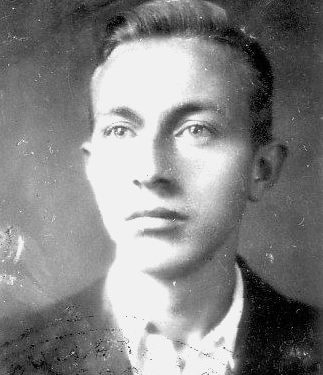
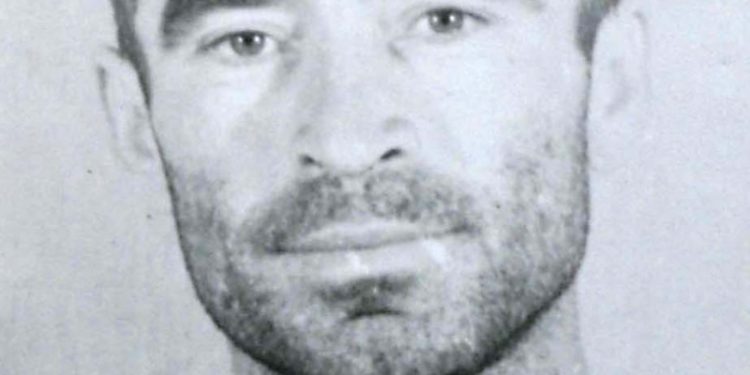
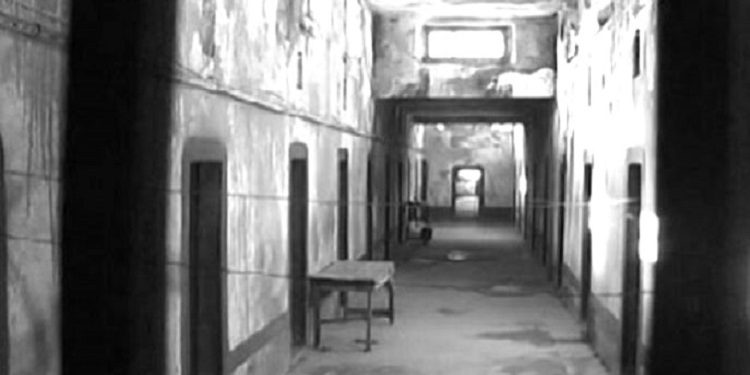
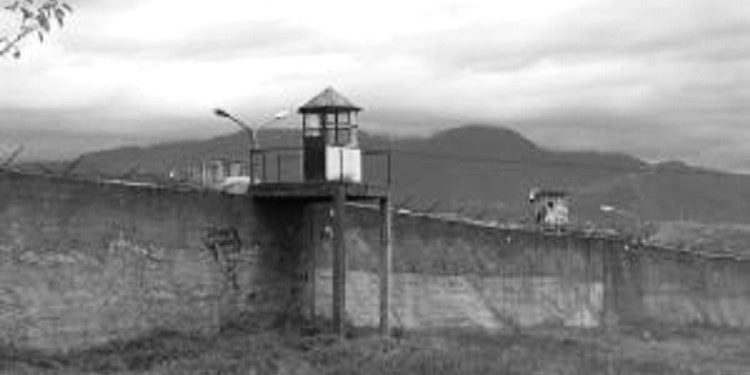
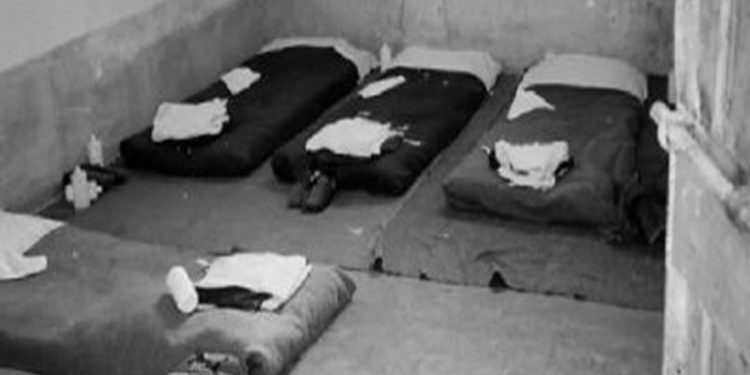
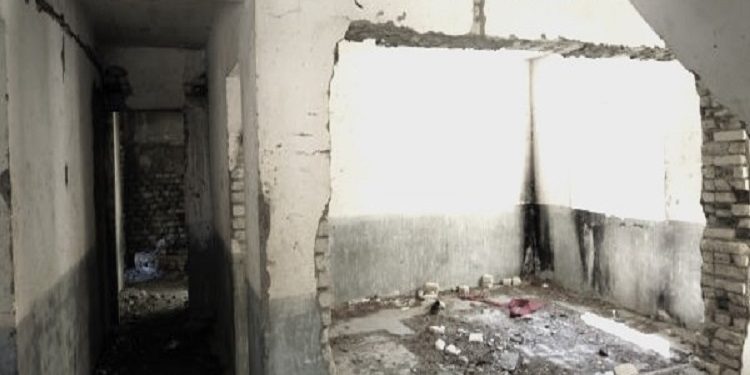
![“The ensemble, led by saxophonist M. Murthi, violinist M. Tare, [with] S. Reka on accordion and piano, [and] saxophonist S. Selmani, were…”/ The unknown history of the “Dajti” orchestra during the communist regime.](https://memorie.al/wp-content/uploads/2026/02/admin-ajax-3-350x250.jpg)
![“In an attempt to rescue one another, 10 workers were poisoned, but besides the brigadier, [another] 6 also died…”/ The secret document of June 11, 1979, is revealed, regarding the deaths of 6 employees at the Metallurgy Plant.](https://memorie.al/wp-content/uploads/2026/02/maxresdefault-350x250.jpg)




